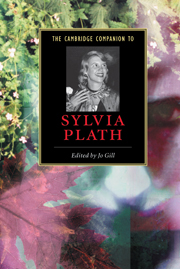4 - Plath and contemporary American poetry
from Part I - Contexts and issues
Published online by Cambridge University Press: 28 August 2006
Summary
To consider the effect of Sylvia Plath's writing on today's poetry scene is to marvel at the endurance of her poems. Nearly thirty years ago, Denise Levertov remarked that a poet need write only a few remarkable poems to be remembered. It goes almost without saying that Plath wrote more than several such poems. More to the point is the fact that the poems of Plath's Ariel and, in retrospect, The Colossus, had the power to transform the direction of American - and to some extent, British - poetics. Here in the twenty-first century, the results of the impact of Plath's work are as pervasive as the influence of Ernest Hemingway's terse yet open prose. These effects are so commonplace that readers today no longer comment that contemporary fiction owes a great deal to Hemingway, the classic modernist. Nor do they align much of contemporary poetry with the influence of Plath's Ariel in 1965 and, even more dramatically, with her Collected Poems in 1981.
Changes in stylistic expression, in each case, marked more than shifts in the techniques of writing. Both Hemingway and Plath thrust deep into their inner lives to find what was worthy of their expression. Impolitic as it was for Hemingway to reveal the painful divergence of his Oak Park, Illinois, parents - which he did so sharply in such In Our Time stories as 'Indian Camp', 'The Doctor and the Doctor's Wife', and 'Cat in the Rain', even more dangerous to her family and her psyche was the insistent anger of Plath's 'Lady Lazarus', 'Daddy' and 'Medusa'. To voice these strident emotions was to unearth new ways of writing. Neither Hemingway nor Plath had earlier models to follow.
- Type
- Chapter
- Information
- The Cambridge Companion to Sylvia Plath , pp. 52 - 62Publisher: Cambridge University PressPrint publication year: 2006
- 1
- Cited by



